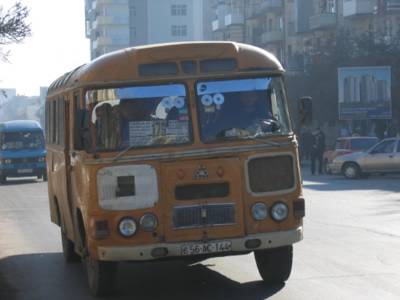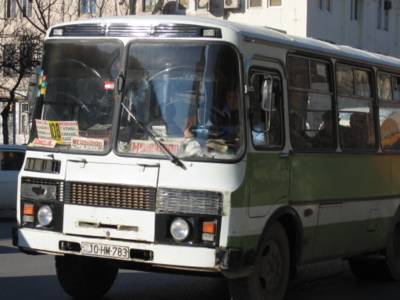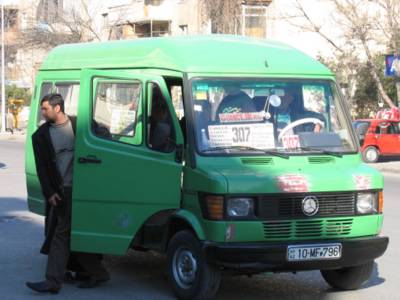Sunday, January 09, 2005
Planes, Trains and Mashrutkas
Baku is the only large city I can think of that does not have a system of municipal buses. Instead, people get around using privately operated mini-buses, known throughout the FSU as Mashrutkas. They are a way of life for people who haven't got their own cars.
There's also an underground metro but it serves the outer suburbs mostly and there's no reason to take it. Several hundred people were killed in a fire on it about 10 years ago. The stations are dirty, crowded and have none of the architecture or grand Soviet-style historical embellishments that stations in Moscow, Tashkent or Kiev have. Even though it costs only five cents to ride, you get what you pay for. It's best avoided.
Mashrutkas travel set routes. It takes a while to learn what all the abbreviated landmarks listed on window placards mean so you know which one to take. While they almost always stop at major intersections or bazaars, you can wave one down or get off anywhere you want. This is a convenience that all public transportation systems should adopt.
The more luxurious mashrutkas are the hand-me-downs from Europe. Some still have German advertising painted on their sides. The less appealing are of dubious parentage, but convey that uniquely Soviet sense of decay and decrepitude. Would-be drivers save their Manat until they are able to purchase a bus and a license, and, as far as I can tell, that's the only qualification needed to begin trolling the streets for passengers.

Mashrut 179 -- Last destination: Siberia
There's a lot of debate in town: Are mashrutkas safe? Well, it depends on what you mean by safe. If you mean "having tires with treads, brakes, floors that you can't see the pavement through and held together with something other than bailing wire," the answer is probably not.
On the other hand, most of the time they're sitting in or moving slowly through Baku's traffic so you're not moving at much speed, nor are you on them for very long, so as long as odds are on your side, you're probably OK. Besides, at 500 Manat a ride (10 cents), they are a lot cheaper for short rides than taxis ($2) and not any more dangerous.

Mashrut 108 -- Looks like a vintage Indian Tata to me.
The DCM (the Ambassador's deputy) at the embassy expressed horror when I told him that I take them frequently.
I have had no problems on Mashrutkas, although I did have a particularly interesting experience last week on the way to the gym. Mashrutka 248 had so many passengers its rusted sides were practically bulging. Petty crime is extremely rare in Baku, but I decided to zip my purse before struggling through the mob at my stop. Sure enough, as I stepped off, I noticed my wallet was gone. There was no question what had happened.

A very well-maintained Mashrutka for Route 307. I hope he has his wallet.
Before the driver could take off, I threw an enormous fit. I had just changed $100 so I was fairly exercised at the prospect of losing my wallet. Besides, what would the Producer say? I banged on the side of the Mashrutka with my fists, jumped up and down and screamed my head off. I went completely mental, mostly because I was incredibly frustrated with my inability to express what the problem was.
The driver and conductor seemed to figure it out pretty quickly.
The driver yelled "policia!" and motioned me to get back on. I did and he sped off, without stopping to let anyone off, to a police station in a part of town I had never been.
It must have been the shift change, because there were about 50 police officers milling around the front gate, waiting for something to happen. Everyone started yelling in Azeri, and the cops pulled guys off the bus one by one, asking me if each was the guy who took my wallet.
Of course, I had no idea who did it. I was mad, but didn't feel, that day, like accusing people unnecessarily.
Azeris hate the police and rightfully so. The police are lazy, inept, corrupt, stupid, and at best, harassing and at worst, violent. Personally, I thought going to the police was a terrible idea. I was sure I'd get shaken down for a bribe which I would be unable to pay since I my wallet had been stolen.
They asked me to get back on the bus. As I did, there it was on the floor! Some guy had quickly emptied his pockets because his pocketknife was next to it. I snatched the wallet and looked inside to see that all my money was there!
The bus drove off and I grabbed a taxi back to the gym.
My staff was extremely impressed by the story. They said I was very lucky because drivers often work in cooperation with the pickpockets. I was feeling smug because rarely in Azerbaijan does someone without language skills get such satisfaction from people like mashrutka drivers or the police.
I still take Mashrutkas, but I do pay a little more attention now.
There's also an underground metro but it serves the outer suburbs mostly and there's no reason to take it. Several hundred people were killed in a fire on it about 10 years ago. The stations are dirty, crowded and have none of the architecture or grand Soviet-style historical embellishments that stations in Moscow, Tashkent or Kiev have. Even though it costs only five cents to ride, you get what you pay for. It's best avoided.
Mashrutkas travel set routes. It takes a while to learn what all the abbreviated landmarks listed on window placards mean so you know which one to take. While they almost always stop at major intersections or bazaars, you can wave one down or get off anywhere you want. This is a convenience that all public transportation systems should adopt.
The more luxurious mashrutkas are the hand-me-downs from Europe. Some still have German advertising painted on their sides. The less appealing are of dubious parentage, but convey that uniquely Soviet sense of decay and decrepitude. Would-be drivers save their Manat until they are able to purchase a bus and a license, and, as far as I can tell, that's the only qualification needed to begin trolling the streets for passengers.

Mashrut 179 -- Last destination: Siberia
There's a lot of debate in town: Are mashrutkas safe? Well, it depends on what you mean by safe. If you mean "having tires with treads, brakes, floors that you can't see the pavement through and held together with something other than bailing wire," the answer is probably not.
On the other hand, most of the time they're sitting in or moving slowly through Baku's traffic so you're not moving at much speed, nor are you on them for very long, so as long as odds are on your side, you're probably OK. Besides, at 500 Manat a ride (10 cents), they are a lot cheaper for short rides than taxis ($2) and not any more dangerous.

Mashrut 108 -- Looks like a vintage Indian Tata to me.
The DCM (the Ambassador's deputy) at the embassy expressed horror when I told him that I take them frequently.
I have had no problems on Mashrutkas, although I did have a particularly interesting experience last week on the way to the gym. Mashrutka 248 had so many passengers its rusted sides were practically bulging. Petty crime is extremely rare in Baku, but I decided to zip my purse before struggling through the mob at my stop. Sure enough, as I stepped off, I noticed my wallet was gone. There was no question what had happened.

A very well-maintained Mashrutka for Route 307. I hope he has his wallet.
Before the driver could take off, I threw an enormous fit. I had just changed $100 so I was fairly exercised at the prospect of losing my wallet. Besides, what would the Producer say? I banged on the side of the Mashrutka with my fists, jumped up and down and screamed my head off. I went completely mental, mostly because I was incredibly frustrated with my inability to express what the problem was.
The driver and conductor seemed to figure it out pretty quickly.
The driver yelled "policia!" and motioned me to get back on. I did and he sped off, without stopping to let anyone off, to a police station in a part of town I had never been.
It must have been the shift change, because there were about 50 police officers milling around the front gate, waiting for something to happen. Everyone started yelling in Azeri, and the cops pulled guys off the bus one by one, asking me if each was the guy who took my wallet.
Of course, I had no idea who did it. I was mad, but didn't feel, that day, like accusing people unnecessarily.
Azeris hate the police and rightfully so. The police are lazy, inept, corrupt, stupid, and at best, harassing and at worst, violent. Personally, I thought going to the police was a terrible idea. I was sure I'd get shaken down for a bribe which I would be unable to pay since I my wallet had been stolen.
They asked me to get back on the bus. As I did, there it was on the floor! Some guy had quickly emptied his pockets because his pocketknife was next to it. I snatched the wallet and looked inside to see that all my money was there!
The bus drove off and I grabbed a taxi back to the gym.
My staff was extremely impressed by the story. They said I was very lucky because drivers often work in cooperation with the pickpockets. I was feeling smug because rarely in Azerbaijan does someone without language skills get such satisfaction from people like mashrutka drivers or the police.
I still take Mashrutkas, but I do pay a little more attention now.



